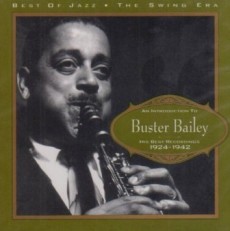
Daily Dose Of Jazz…
William C. “Buster” Bailey was born July 19, 1902 in Memphis, Tennessee and was educated on the instrument by classical teacher Franz Schoepp, the man who taught Benny Goodman. He got his start with the W.C. Handy Orchestra in 1917 when he was just fifteen years old. After two years of touring with Handy, he quit while the band was in Chicago and in 1919 Bailey joined Erskine Tate’s Vendome Orchestra.
1923 saw Buster joining up with Joe “King” Oliver as part of his King Oliver’s Creole Jazz Band. It was here that he met and became friends with fellow band mate Louis Armstrong. In 1924, when Armstrong left King Oliver’s Jazz Band to join the Fletcher Henderson Orchestra in New York. It was less than a month that Armstrong extended an invitation for Bailey to join the band and accepting, he moved to New York City.
During the late 1920s Bailey became a highly respected sideman with Perry Bradford, Clarence Williams and others, Recording both clarinet and soprano saxophone. He toured Europe with Noble Sissle’s orchestra in 1927, returned and performed with Edgar Hayes and Dave Nelson, rejoined Sissle in 1931. By 1934 he was back with Henderson and then settled in with the John Kirby Band. Off and on he would perform with the mills Blue Rhythm Band, Midge Williams and Her Jazz Jesters and record as a leader as Buster Bailey and His Rhythm Busters.
In 1947 he joined Wilbur de Paris and performed with him until 1949. During the early 1950s Bailey was with Big Chief Russell Moore but for most of the decade he played with Henry “Red” Allen. From 1961 to 1963 he performed with Wild Bill Davison, the Saints And Sinners, and rejoined his old friend Armstrong and became a member of Louis Armstrong and His All-Stars.
Buster appeared on film three times during his career in That’s The Spirit in 1933, Sepia Cinderella in 1947 as part of John Kirby’s band and in When The Boys Meet The Girls in 1965 with Louis Armstrong. He also appeared in 1958 in the DuMont TV series Jazz Party and in 1961 on the TV program The Dupont Show of the Week in an episode titled “America’s Music – Chicago and All That Jazz”.
Clarinetist Buster Bailey, who was also well versed on saxophone and one of the most respected session players of his era, passed away in Brooklyn, New York on April 12, 1967 of a heart attack.
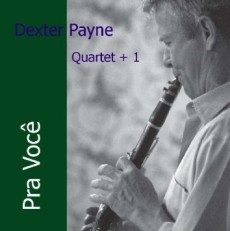
Daily Dose Of Jazz…
Reedman Dexter Payne was born on July 5, 1951 in Denver, Colorado. The clarinet was his first instrument and went on to master the alto and baritone saxophones adding them to his arsenal. His early influences were Artie Shaw, Buddy DeFranco, Benny Goodman, Stan Getz, Zoot Sims, Gerry Mulligan,Benny Carter, Johnny Hodges and Lester Young.
A very lyrical and melodic player, Dexter plays swing, bop, cool jazz, and Brazilian jazz as well as other forms of music including Latin. In 2000 he played with Brazilian musician Thiago de Mello, recorded the album Inspiration in 2003, with Brazilian guitarist Antonio Mello,
He followed with his sophomore release in 2005 release Another Feeling with producer Arnaldo De Souteiro on his Jazz Station label. He recorded again in 3006 and 2007 which de Mello produced and released Our Time to Remember. Clarinetist and saxophonist Dexter Payne continues to perform, record and tour.
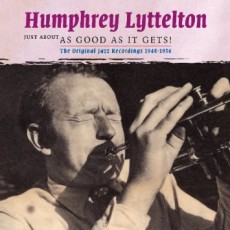
Daily Dose Of Jazz…
Ian Christie was born on June 24, 1927 in Blackpool, Lancashire, England to a father who was a piano tuner and banjoist. He took lessons from Charlie Farrell but opted to join the Royal Air Force, taking up photography as his primary interest. After his brother Keith joined Humphrey Lyttleton’s band, he soon followed, finishing his photography studies with financial help from Humphrey.
During the 1950s and 1960s Ian worked extensively with Mick Mulligan and George Melly as well as playing in a number of trad jazz ensembles, and forming a group with his brother Keith, Ken Coyle and Dicky Hawdon called the Christie Brothers’ Stompers.
Throughout his career he continued to work in trad jazz ensembles into the 2000s, with the Wyre Levee Stompers, the Merseysippi & Parade Jazz Band, and the Tony Davis Band, among others. In his later years he played with Graham Tayar in his Crouch End All Stars. Aside from playing music clarinetist Ian Christie worked as a film critic for The Daily Express for over 25 years and as a photographer until his passed away on January 19, 2010.
More Posts: clarinet
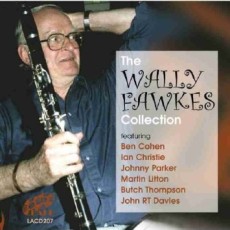
Daily Dose Of Jazz…
Wally Fawkes was born Walter Ernest Fawkes on June 21, 1924 in Vancouver, Canada. His family moved to Britain in 1931 and enthused by comic books he started out pursuing a career as a cartoonist, first enrolling in Sidcup Art School. Due to financial restraints he left school, took a job painting camouflage onto factory roofs at the onset of WWII but a bout of pleurisy kept him from service.
The Coal Commission employed Fawkes to work on maps and in 1942 he entered an art competition that was adjudicated by the Daily Mail and was found work in the Clement Davies ad agency and later at the Daily Mail drawing column-breaks and decorative illustrations.[1]
It was during the war years that he began playing in jazz bands and because of the amount of time spent in air raid shelters that people living in London were becoming troglodytes and adopted the name for one of his first groups – Wally Fawkes and the Troglodytes. In 1947 he joined the George Webb Dixielanders, a semi-professional revivalist jazz band that featured Humphrey Lyttelton on trumpet. The two would leave and form their own group that evolved into mainstream jazz. He would record with Sidney Bechet in 1949, George Melly and John Chilton in the early Seventies.
Over the years clarinetist Wally Fawkes combined playing jazz with his love of cartooning and had a successful career in both. His political satire in the comic strip he illustrated gained praise from Prime Minister Margaret Thatcher. Poor eyesight retired him from cartooning at the age of 81 and he has concentrated solely on his clarinet playing.
More Posts: clarinet
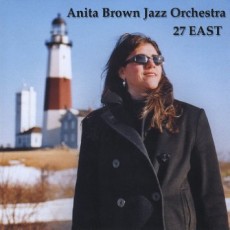
Daily Dose Of Jazz…
Anita Brown was born June 17, 1959 in South Hamilton, Massachusetts. She attended and graduated the Pingree School and Andover High School before her family moved to Long Island, New York in 1977. It was at this juncture in her life that she began studying voice, phrasing and inflection with Lennie Tristano, first imitating Billie Holiday and then singing the solos of Lester Young.
A year later she enrolled at SUNY Old Westbury, majored in Music Education, adding photography, dance and choreography to her schedule. In 1980 Anita transferred her major to the University of New Hampshire concentrating on classical piano and voice. In her junior year that she discovered her passion of conducting and by the time she graduated she had a considerable transcript of instrumental and choral conducting along with score study under her belt.
Brown began her career in conducting also in her third year at UNH as a part time band director, prior to graduation and moving back to New York. In addition to studying clarinet, she took on and mastered the trumpet, continuing to play, write and teach. By 1995 she was at the BMI Jazz Composers Workshop and building a body of work for jazz orchestra guided by Jim McNeely, Manny Albam and Mike Abene. There she composed and contributed compositions that were featured in the annual concerts and was a finalist in 2001 and 2003 Charlie Parker Composition Competitions.
In 2000 she founded the Anita Brown Jazz Orchestra, independently recording and releasing her debut CD, 27 East, to critical acclaim and was appeared in six categories on the ballot for the 46th Grammy Awards. She was the first recipient of the ASCAP/International Jazz Composers’ Symposium New Music Award for Big Band Works for her piece The Lighthouse, selected by Bob Brookmeyer, ohn Clayton and Dave Douglas.
She has written arrangements for Nnenna Freeelon, The ount Basie Orchestra, the Jon Faddis jazz Orchestra, Chiuck Owen, and the Jazz Surge, Roseana Vitro, Bobby Short and a number of New York R&B bands.
The Vanguard Jazz Orchestra, the U.S. Army Jazz Ambassadors, BMI New York Jazz Orchestra and numerous college and high school jazz ensembles have performed her original works. As an educator she is on the faculty of New Jersey City University and Sara Lawrence College, and established her Composer Residency Project.
Conductor, arranger and composer Anita Brown consults planning and producing recordings and performances, has served as copyist and/or assistant to Jim McNeely, Maria Schneider, Many Albam, Don Sebesky, John Pizzarelli, the Vanguard Jazz Orchestra, Carnegie Hall Jazz Band and Toshiko Akiyoshi Big Band while serving as archivist for the Gil Evans and Manny Albam estates.
Music: https://youtu.be/9KZo1ItnDCE


